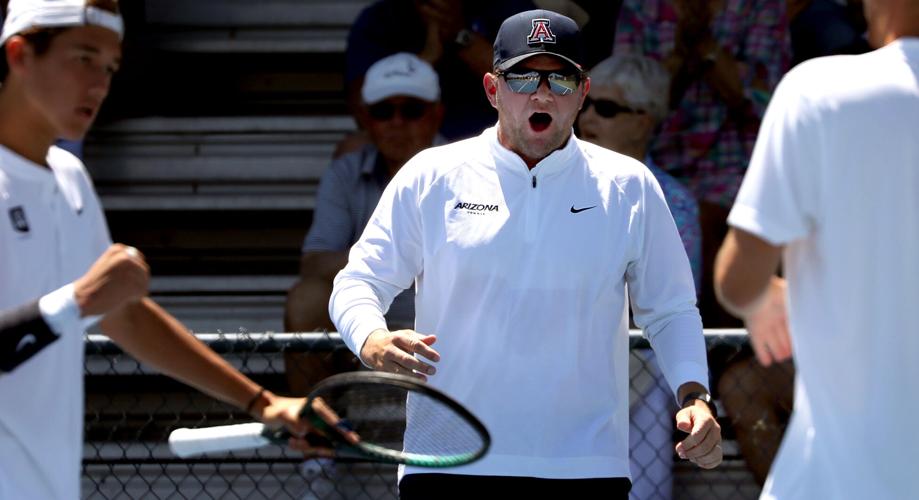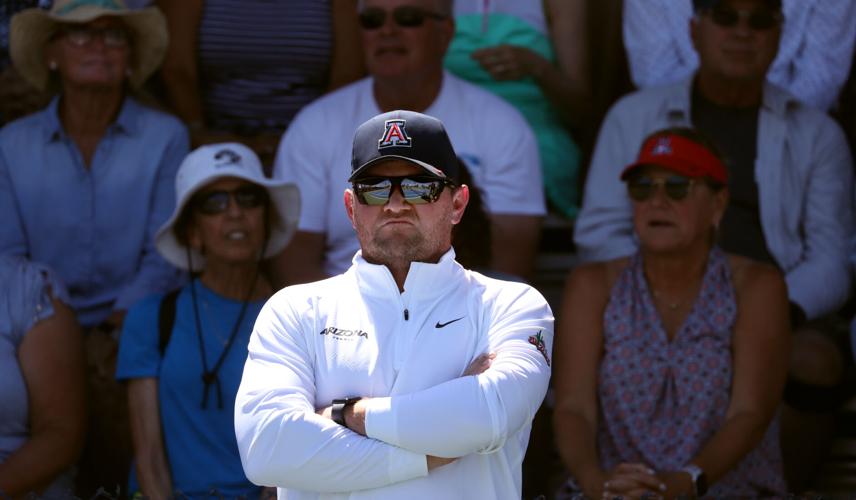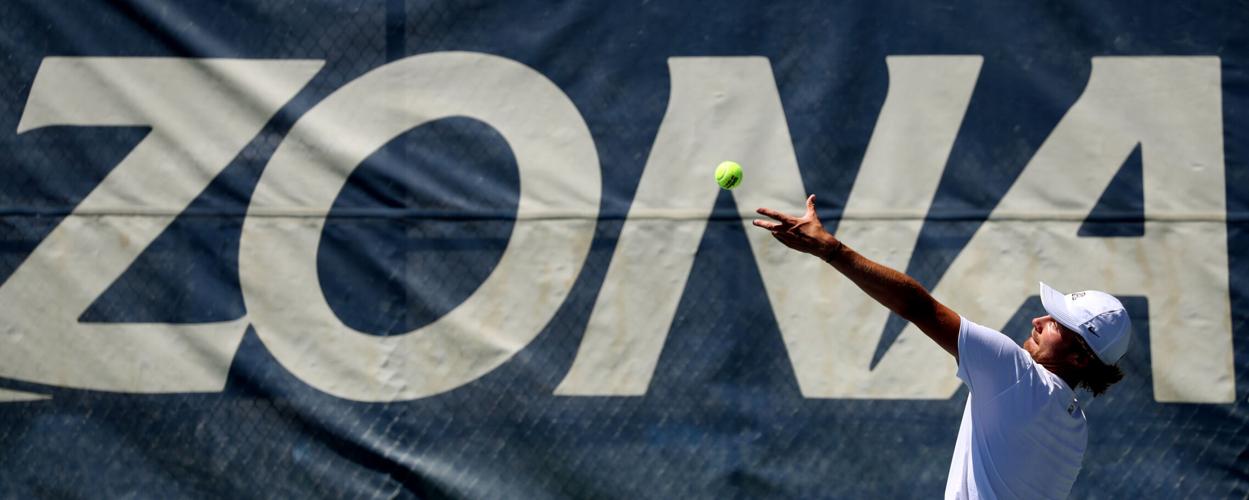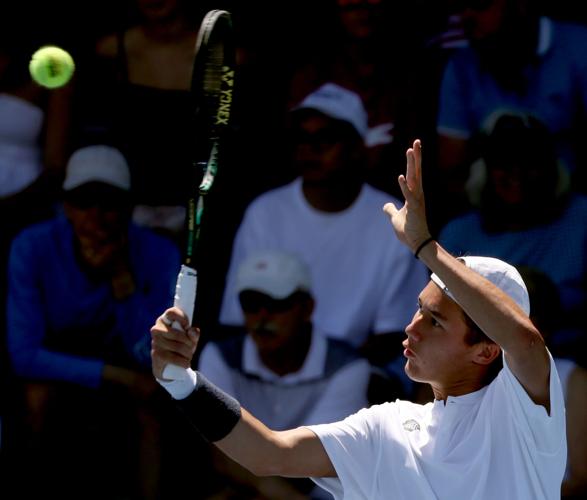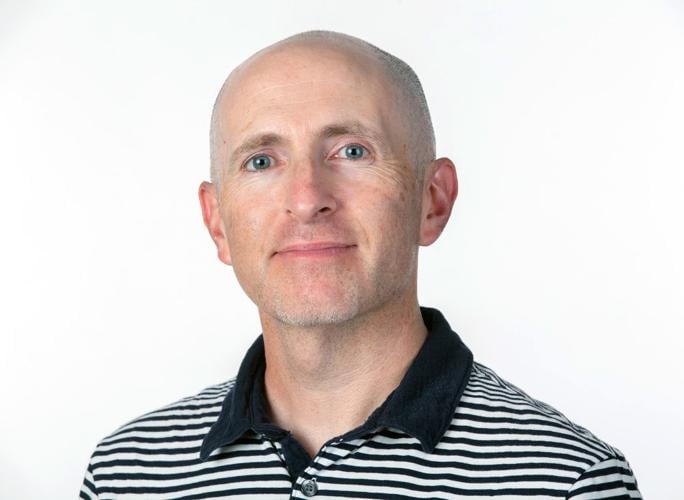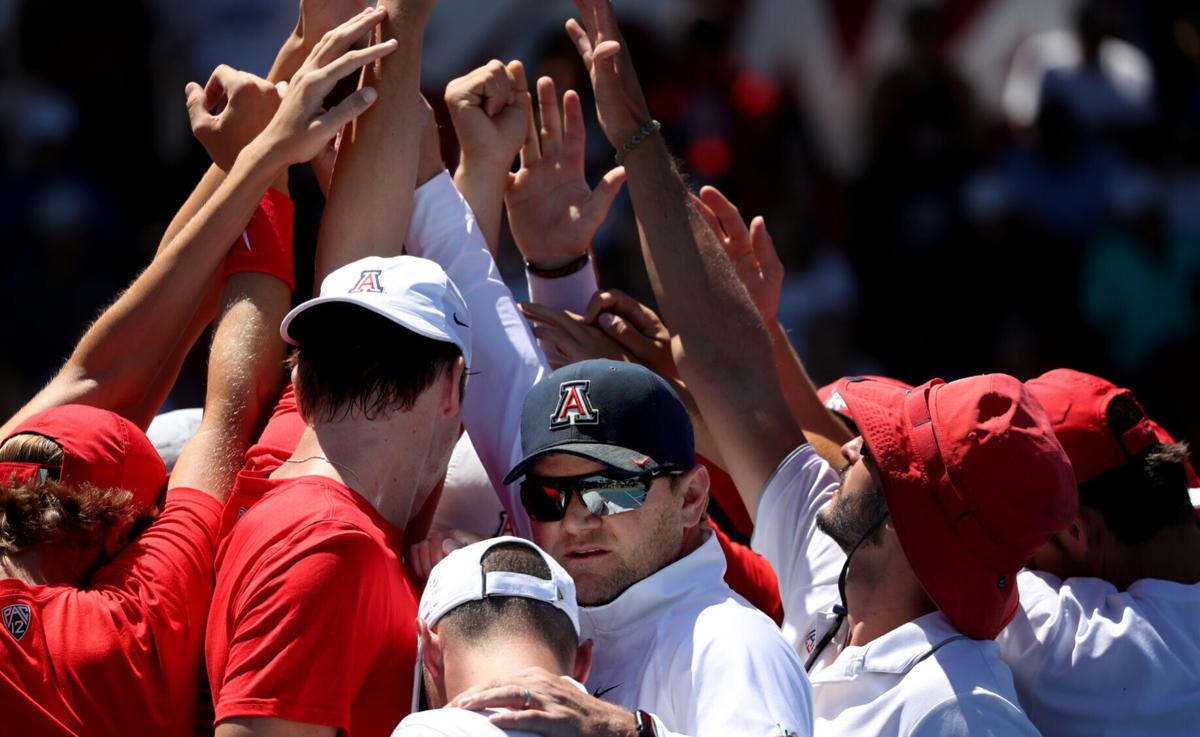Clancy Shields desperately wanted Jonas Ziverts to be a part of what Shields was building with the Arizona men’s tennis program.
Ziverts is from Solna, Sweden, located just north of Stockholm. Getting there from here is a bit more challenging than driving up the freeway to Scottsdale.

Michael Lev is a senior writer/columnist for the Arizona Daily Star, Tucson.com and The Wildcaster.
“It was a 20-some-hour flight,” Shields recalled of his journey in the summer of 2018. “I show up at the facility, see him, wave at him, and he just gives me a nod and walks off. And I just started thinking to myself, ‘I’m gonna fly three days here and back, and I just got a nod from this kid? There’s no way.’
“So the whole trip I’m just trying to find my opportunities to get in. I met with his coaches and finally met with him, and I just had this feeling that we’re not going to get this kid.”
Shields learned that Ziverts’ brother, Rasmus, was his “champion” — someone who might be able to sway him. Still, even after a campus visit, the recruitment was “treading water,” Shields said.

After a challenging recruitment, Jonas Ziverts committed to Clancy Shields and Arizona and became one of the Wildcats' best players and team leaders.
Finally, Shields gave Ziverts something of an ultimatum.
“I’m not getting off the phone until you commit to Arizona,” Shields told Ziverts.
“And there’s this long pause,” Shields said during a recent 30-minute interview in his cluttered office at McKale Center. “It felt like a lifetime. It was like 10 seconds.”
Ziverts said yes. He became the highest-ranked recruit Shields had signed since becoming Arizona’s coach in 2016.
Ziverts would go on to have one of the most decorated careers in UA men’s tennis history. He would help lift the program to unprecedented heights.
His recruitment is an example of Shields’ relentlessness. His development, as a player and person, is a testament to the culture Shields has created.
“At the end of it, he’s the best captain, the best senior,” Shields said. “He went from being maybe the most selfish kid we’ve ever had in our program to the most unselfish kid I’ve ever had. Five years can do that. A culture can do that.
“He ended up flying out here in January to see the team. He was the loudest guy on the courts. You’re like, ‘Man, there’s just a lot of pride in this place.’ ”
Engineering the turnaround
Shields, 37, is the driving force behind that feeling. With equal parts passion and determination, he has transformed the Wildcats from a doormat into a powerhouse.
Before Shields arrived from Utah State, Arizona had won one Pac-12 match in a six-year stretch. Heading into Sunday’s regular-season finale at Oregon, the Wildcats have a 24-5 record in conference play over the past four years.
Before Shields got here, Arizona hadn’t made the NCAA Tournament since 2010. The Wildcats are about to make it five in a row (excluding 2020, when the tournament wasn’t contested).
Last year, Arizona achieved a program-best No. 12 ITA ranking. Currently, the Wildcats are ranked 10th.

Arizona coach Clancy Shields has a little celebration after Jay Friend, left, and Jonas Ziverts scored in their doubles match against Oklahoma State in the second round of the NCAA Men’s Tennis Tournament in Tucson on May 6, 2023.
What’s the secret to Shields’ success? What has he been able to implement here that others couldn’t?
The word that springs to mind is investment. Shields pours his heart and soul into the program. The players feel that and, in turn, give him everything they’ve got.
“The fact that we’ve had so many record-breaking seasons is, I think, a testament to him and what he’s seen in everybody,” said junior Colton Smith, Arizona’s No. 1 singles player. “(It) just goes to show his determination, his hard work and his discipline — and just his love for everybody at the U of A and for the guys on the team. It’s something that’s very special to be a part of.”
Arizona had its Senior Day this past Sunday, honoring Herman Hoeyeraal, Nick Lagaev and Gustaf Strom. Lagaev is completing his fifth year with the program. Shields and his staff estimated that Lagaev has spent more than 2,500 hours on the court in UA gear between practices and matches.
Without context, that seems like an incomprehensible number — an above-and-beyond commitment.
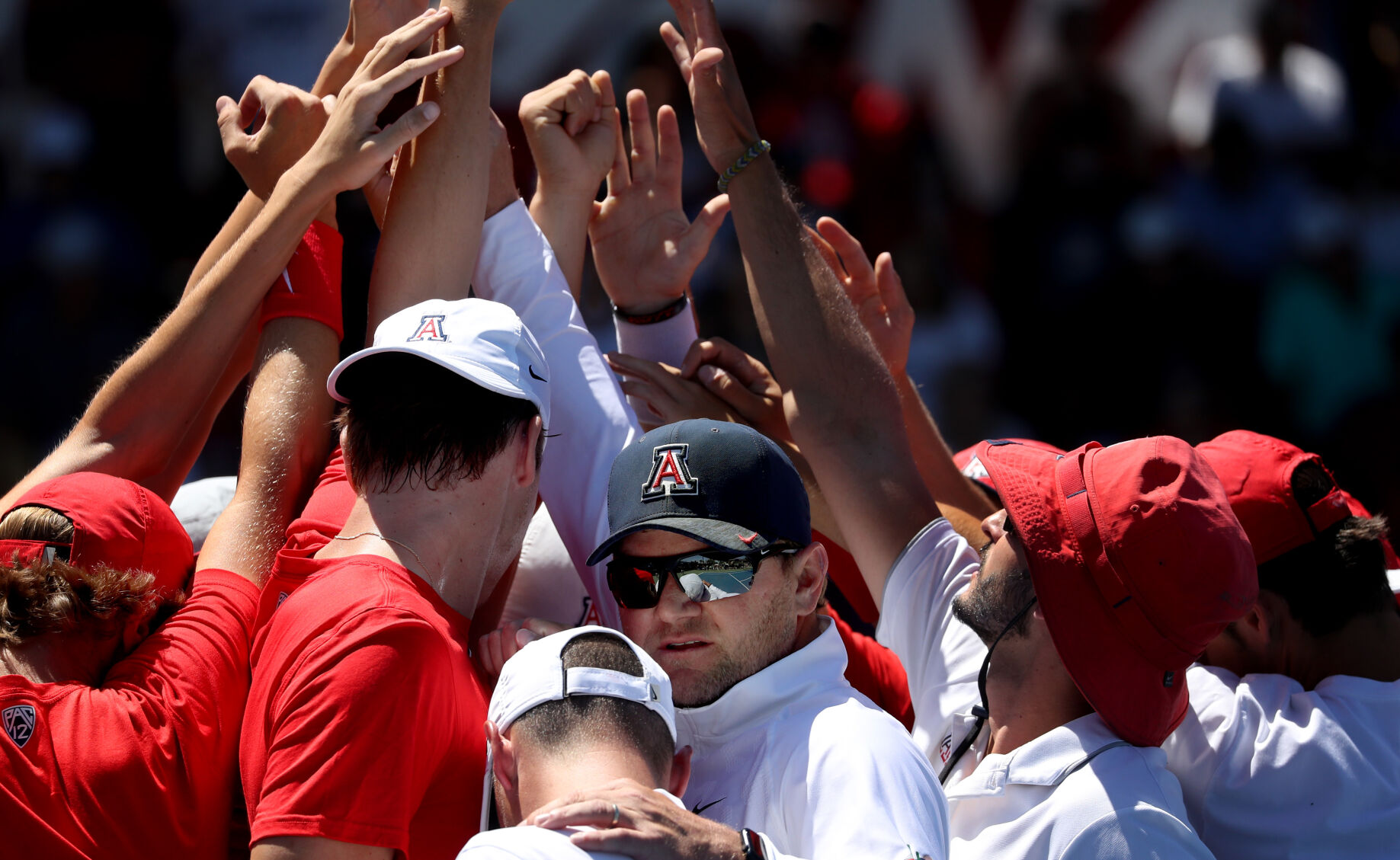
Arizona coach Clancy Shields, shown gathering his team just before the first round of the NCAA Men’s Tennis Tournament in May 2023, has transformed the Wildcats into a powerhouse through relentless recruiting and player development.
Shields does worry about burnout, having experienced it himself as a nationally-ranked junior. All too often, he said, young players lose interest in their sport because they stop improving.
Shields is determined to not let that happen to his charges. He challenges them but also lays out a plan and vision for what they can become.
“Every time they come to the practice court, every time they come spend time with us, they know that we’re going to be doing something that is going to help them improve and get better,” Shields said. “I hope that’s what the kids feel that they’re getting here, and then they tell their buddies about it and … word of mouth spreads that this is a good place if you want to develop your game.”
It appears to be working: Arizona’s 2024 recruiting class is ranked sixth nationally, per TennisRecruiting.net.
Additionally: Only three undergrads who’ve played for Shields have transferred to other four-year schools.
In this day and age, that’s a truly incomprehensible number.
“More than anything, he’s a great guy,” Smith said. “The bond that we’ve built is something that I definitely cherish.”
For the kids
Shields said the hardest part of building Arizona into a contender — a team he believes can win the national championship this year — was setting the foundation. The Wildcats didn’t win a conference match in either of his first two seasons.
But after a successful run at Utah State, Shields had a formula. It can be boiled down to this: “Developing a culture of hard work, (recruiting) a bunch of blue-collar players who are going to outwork the competition and just trying to find every little detail we can to get better.”
Shields and his staff have created a checklist of priorities for identifying future Wildcats. It contains 16 traits, but the first three are paramount:
Does this kid really love the game?
Is he competitive?
Does he work hard?

Arizona’s Jay Friend hits a return during doubles action against Oklahoma State in the second round of the NCAA Men’s Tennis Tournament on May 6, 2023.
“If they can check those first three boxes,” Shields said, “we want the kid and we’re going to do everything we can to get them.”
Shields remembers current sophomore Jay Friend checking those boxes as he talked to him on the phone for 45 minutes from a parking lot in Baltimore, where Shields was attending a friend’s wedding. Friend is already Arizona’s No. 2 singles player and partners with Smith on the No. 1 doubles team.
Friend is an example of a recruit who, as Shields characterized it, is “one level below the bluebloods.” Shields has deliberately targeted those players.
“Some of these kids that weren’t the highest ranked,” he said, “they come in with a big chip on their shoulder and they’re ready to work.”
Players must possess — excuse the pun — a baseline level of talent to play for Arizona. But the intangibles matter just as much to Shields. When he found out that class of 2017 recruit Filip Malbasic had played two tournaments with a broken hand, Shields knew that he wanted him.

Arizona coach Clancy Shields watches his Wildcats take on Boise State in the first round of the NCAA Men’s Tennis Tournament in Tucson on May 5, 2023.
“You don’t just look at a video and offer a kid,” Shields said. “You spend years watching the kid at tournaments and talking to their coaches and their friends and family. Spend some time talking to a parent for an hour and … you’ll get to know the kid.”
Players know what they’re getting from Shields. He’s going to coach them hard. He’s going to, as he put it, “push their buttons at times.” More often than not, he’s going to pull the best out of them.
All Shields seeks is an investment equal to the one he’s giving.
Last summer, Shields signed a contract extension through 2028. Dave Heeke was Arizona’s athletic director at the time. Greg Byrne hired Shields. He’s now on AD No. 3, Desireé Reed-Francois.
Programs with deeper pockets and richer histories undoubtedly have reached out to Shields. He has no plans to leave anytime soon, if ever. Refreshing, isn’t it?
When he drives home every day to Marana, where he lives with wife Tana and dog Piper, Shields thinks about where he is and what truly matters. Check that; who truly matters.
When you spend 2,500 hours with someone, you can have a huge impact on their life. If they’re here for five years, it’s nearly a quarter of their existence.
“I always try to take an inventory of the blessings I have, and it always comes back to the kids,” Shields said. “I don’t think it’s possible that I could ever leave this program.
“You recruited them. You’ve worked to develop them. You’re so emotionally invested in them. … These kids are your whole life.”
Wildcat junior Colton Smith's unconventional approach to tennis brings balance and fun. Fishing on his days off helps gives Smith, who was ranked No. 20 by ITA this week, a reset.


